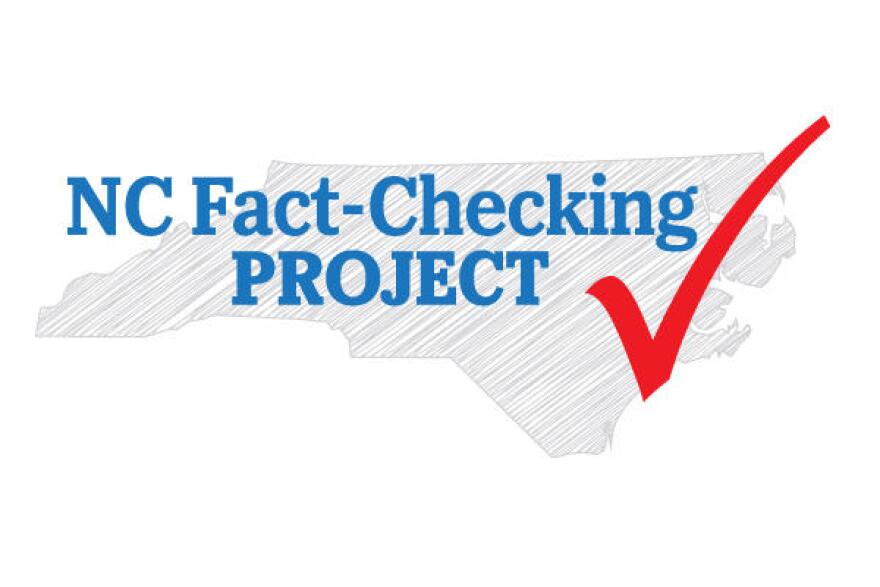A move by several newly-elected North Carolina sheriffs to no longer honor requests from immigration agents to detain suspects has drawn the ire of Republican lawmakers. In February, Buncombe County Sheriff Quentin Miller announced the change saying it’s vital that immigrants can call the sheriff’s office without fear.

House Speaker Tim Moore went on Fox’s Ingraham Angle two weeks ago to discuss Republicans’ response. Host Laura Ingraham started off by playing a portion of Miller’s announcement, saying that a detainer request is not a valid warrant.
“I respectfully say that Sheriff is wrong and that’s why we’ve filed the legislation we have to mandate that sheriffs must honor these ICE detainees,” Moore said in response.
After a committee vote this week, that bill is now headed to the House floor. Paul Specht of The News & Observer joined Morning Edition’s Lisa Worf to discuss the bill as part of WFAE’s weekly fact check of North Carolina Politics.
Lisa Worf: First off, why aren’t these sheriffs — including Mecklenburg County Sheriff Garry McFadden — honoring these ICE detainers and what are ICE detainers?
Paul Specht: Well first, ICE detainers are a request from Immigration and Customs Enforcement for jails to continue holding immigrants that they hope to gain custody of. So it's a slip of paper given to a local law enforcement agency from a federal immigration agency. Their hope is to deport people that are in the country illegally and to do that often, they need cooperation from local law enforcement agencies like sheriff’s offices.
In North Carolina, there are — I believe — six different sheriff's offices that have said they will ignore ICE detainer requests. And this is done for multiple reasons. For one, they might face political pushback from voters if they work with ICE. ICE has become sort of a controversial agency. So it's sort of come to the fore this election. I can't remember a time in previous years where people voted for sheriffs with this as their top issue. But this year they did.
Worf: So what is the reasoning behind not honoring these requests?
Specht: The reasons go beyond pure politics. There have been cases where sheriff’s offices and law enforcement agencies have decided to cooperate with ICE, but in doing so were found by federal courts and judges to have violated those people's civil rights.
So let's say, for example, someone is arrested but then they make bail or the charges are dropped or whatever and they're allowed to be released. If ICE comes in and sends a detainer and the jail honors that detainer and holds them beyond the amount of time they're legally required to, that sheriff's office opens itself up to legal recourse.
[Related Content: Bill Requiring NC Sheriffs To Cooperate With ICE, Hold Immigrant Detainees Advances]
There have been several cases across the country where advocacy groups and immigrants have sued jails that help people and won — they've won those cases. So there are legal and financial considerations that go into sheriffs deciding whether or not they're going to honor these detainers.

Worf And what is the difference between a detainer request from Immigration and Customs Enforcement and a criminal warrant?
Specht: A criminal warrant is signed by a judge who reviews a case and decides OK, you have the legal authority to go take custody of this person or this person's belongings or search that person's house — you've heard of search warrants.
ICE detainers are not reviewed by judges. There is national legislation that empowers ICE to take custody of people believed to be in the country illegally, but their detainers don't have the power that warrants do. And so judges have ruled that ICE detainer requests of sheriffs and local law enforcement agencies are not binding. People in sheriff’s offices and police agencies and things like that can choose to agree or not agree to hold the person that ICE wants on their behalf, which is why Republicans in North Carolina filed this bill. They want to require sheriffs across the state to honor ICE detainer requests.
Worf: I figure if House Speaker Moore supports this legislation, he knows these sheriffs are within their rights not to honor them at least at this point in North Carolina. So how does he explain his answer on the Ingraham Angle?
Specht: We reached out to his folks and asked, you know, what did you mean? And they said that Speaker Moore was speaking more generally — that he meant the sheriff is wrong to not comply with detainer requests not necessarily wrong about the legal authority behind ICE detainers. That makes sense to some degree because why would they file this bill if they thought ICE detainers did already have the necessary legal authority to require sheriff's departments and other law enforcement agencies to comply? But it was certainly — the way it was framed in the show — certainly misleading, which is why PolitiFact thought we should look into it.
Worf: So how did you rate his answer then?
Specht: We didn't rate Moore's answer. We rated Buncombe County Sheriff Quintin Miller and we gave him a true rating for his statement about ICE detainers not being valid warrants. He's right. They're not. And that's been reiterated again and again in federal court.
Paul Specht will be joining WFAE’s Morning Edition every Wednesday to Fact Check North Carolina news. If you have any claims you want the PolitiFact team to check out, you can email them at factcheck@newsobserver.com.





